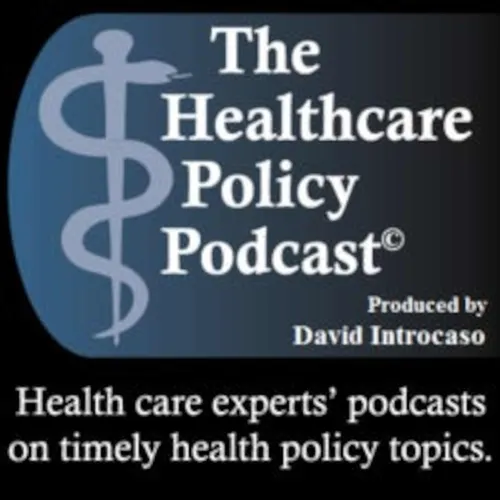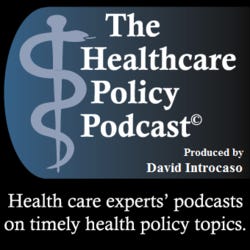
The Healthcare Policy Podcast ® Produced by David Introcaso
Health care experts' podcasts on timely health policy topics.
- Update frequency
- every 16 days
- Average duration
- 29 minutes
- Episodes
- 319
- Years Active
- 2012 - 2025

Are Medical Errors the Third Leading Cause of Death in America?: A Conversation with Rosemary Gibson (November 21st)
In 1999 the Institute of Medicine published "To Err Is Human," a report that shocked the medical establishment because it concluded as many as 98,000 Americans die annually from hospital ca…

Reforming Graduate Medical Education to Address the Healthcare Workforce Shortage: A Conversation with Dr. David Goodman (November 14th)
It's estimated in the next few years the Affordable Care Act will add 25 million Americans to the health care insurance rolls. In addition, 10,000 Americans age into Medicare every day. C…

Hospital-Acquired Infections Contribute to 100,000 Deaths Per Year, What's Being Done to More Effectively Treat Them: A Conversation with Amanda Jezek (November 13th)
Conservative estimates show hospital-acquired infections (HAIs) sicken two million Americans, directly kill 23,000 and contribute to a total of 100,000 deaths each year. The bacterial infe…

How Best Can Medical Malpractice Policy Be Reformed: An Interview with Janice Mulligan (October 18th)
US medical malpractice policy is considered to be substantially flawed. Only a small percent of patients harmed file claims, awards even for similar injuries vary widely, and "defensive" m…

Interview with Robb Cohen on Proposed Changes to Maryland's Hospital All Payer System (October 17th)
For nearly four decades, Maryland's “all payer” system has set hospital prices for the state's 53 hospitals. The state regulates prices for every insurer including Medicaid, Medicare and p…

Enroll America's Efforts to Maximize ACA Insurance Coverage: An Interview with Jessica Barba Brown (October 4th)
This past October 1st uninsured Americans who qualify for coverage under the Affordable Care Act could begin choosing a health care insurance plan offered via their state's healthcare insur…

What Progress Did the Congressionally-Appointed Long Term Care Commission Make: An Interview with Judy Feder (September 30th)
As part of last year's "fiscal cliff" agreement the Congress created a Long Term Care/LTC Commission tasked to make recommendations to improve LTC delivery. (The Commission was created la…

How Safe Are Medical Devices: A Conversation with Diana Zuckerman (September 25th)
Medical devices, everything from tongue depressors to pace makers and defibrillators, are regulated by the FDA. How competently or effectively the FDA regulates these products has been questioned fo…

Do Workplace Wellness Programs Work and For Whom: A Conversation with Helen Darling (September 23rd)
Today nearly all large employers offer a workplace wellness programs and most small employers that offer health benefits also offer at least one wellness program. Typically these programs …

Implementing (and Improving) the ACA: A Conversation with Professor Len Nichols (September 13th)
During this 21-minute interview, Professor Nichols discusses the reasons for the decline in health care cost growth and whether its slowing will persist, alternative payment models (to fee …

Improving Chronic Care Means Improving Functional Status: A Conversation with Dr. Gretchen Alkema (August 13th)
The most expensive Medicare beneficiaries are not those with multiple chronic conditions. They are those with chronic conditions AND functional impairment (i.e., those needing help with ro…

Will the FDA Ban Menthol-Flavored Cigarettes? A Conversation with Dr. Andrea Villanti and Ms. Diane Canova (August 6, 2013)
In 2009 the Congress overwhelmingly passed landmark legislation (commontly termed the "Tobacco Control Act") that included banning flavored cigarettes - except menthol. Instead, the Congre…

The Demise of the CLASS Act and the Future of Long Term Care Insurance: A Conversation with Ms. Connie Garner (August 5, 2013)
While the vast majority (70%) of people turning 65 will need long term care services for an average of three years, only 7 million Americans own a long term care insurance policy. Medicare…

Pharmaceutical Marketing Abuses: A Conversation With Dr. Adriane Fugh-Berman (July 10, 2013)
Recently the French government fined Sanofi $53 million for what it called a smear campaign against a competitor drug manufacturer. Ranbaxy was fined $500 million, in part, for making fal…

The Importance of Advanced Care Planning: A Conversation with Charlie Sabatino (June 28, 2013)
The lowlight during the 2009-2010 ACA debate was Governor Palin's invention of "death panels" (PolitiFact's 2009 "Lie of the Year") in response to a proposal to allow Medicare to pay physic…

Dr. William Rogers Discusses Providing Healthcare for the Homeless (June 12, 2013)
The homeless of course suffer substantial health problems. The CDC estimates nearly half have one or more chronic health condition (e.g., heart disease, diabetes, cancer), two in five have…

The ACA and Hospital Consolidation: A Conversation with Dr. Paul Ginsburg (June 12, 2013)
In 2009, or the year before the Affordable Care Act passed, the Herfindahl-Hirschman Index (used by the FTC and the DoJ) defined hospital ownership as "highly concentrated" in over 80% of t…

Tim Jost Discusses State Health Insurance Exchanges (June 3, 2013)
The centerpiece of the Affordable Care Act are the state health insurance exchanges where individuals beginning October 1st will be able to buy health care insurance with coverage beginning…

Christine Bechtel Discusses the State of Health Information Technology (HIT) Adoption and Use (May 28, 2013)
The health care sector has substantially lagged all other major industries in the adoption and use of information technology. For example, per the CDC, in 2011 still slightly more than hal…

Matt Hourihan Discusses the NIH Budget (May 23, 2013)
After the doubling of the National Institutes of Health's (NIH) budget between 1998 and 2003, federal funding for medical research and more widely federal R&D has been falling or stagnate o…